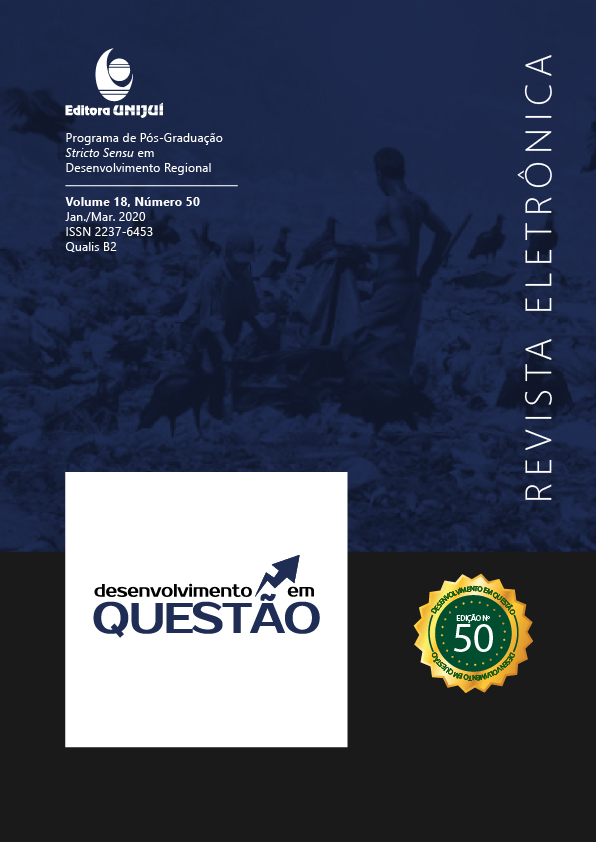Ecoinovação no Agronegócio: revisão sistemática da literatura
DOI:
https://doi.org/10.21527/2237-6453.2020.50.201-216Palavras-chave:
desenvolvimento sustentável, inovação ambiental, inovação ecológica, inovação verdeResumo
As crises sócio ecológicas globais enfrentadas pela sociedade contemporânea requerem o desenvolvimento de inovações ambientais pautadas na sustentabilidade, denominadas nesse estudo, como ecoinovações. No contexto agrícola/agronegocial tal necessidade torna-se ainda mais evidente, haja vista sua relação direta entre impactos agro ecossistêmicos e mecanismos de mercado. Com vistas à essa conjuntura, a pesquisa realizada teve como objetivo analisar as diferentes abordagens da ecoinovação no contexto agrícola/agronegocial, existentes na literatura. Para tanto, realizou-se uma revisão sistemática da literatura a partir de artigos científicos de alto impacto publicados nas bases de dados Scopus e Web of Science. Os resultados obtidos demonstraram uma evolução temporal das publicações, predominantemente nos últimos três anos, associada à uma evolução conceitual do fenômeno estudado. As abordagens de ecoinovação foram divididas em quatro grupos: ecoinovação em produtos e processos; difusão da ecoinovação; avaliação do ciclo de vida, e; sistemas de ecoinovação. Assim, sintetizam-se os esforços científicos em prol do entendimento e viabilização desse fenômeno e suas distintas interfaces. Como tendências e desafios para a ecoinovação no contexto analisado, tem-se principalmente a multidisciplinariedade dessa temática, o que dificulta estabelecer estratégias para seu desenvolvimento. Todavia, apresenta-se um conjunto de potencialidades que envolvem inovação ambiental no agronegócio, apresentando possíveis diretrizes para o desenvolvimento sustentável das atividades agrícolas.
Downloads
Publicado
Como Citar
Edição
Seção
Licença
Ao publicar na Revista Desenvolvimento em Questão, os autores concordam com os seguintes termos:
Os trabalhos seguem a licença Creative Commons Atribuição 4.0 Internacional (CC BY 4.0), que permite:
Compartilhar — copiar e redistribuir o material em qualquer meio ou formato;
Adaptar — remixar, transformar e criar a partir do material para qualquer fim, inclusive comercial.
Essas permissões são irrevogáveis, desde que respeitados os seguintes termos:
Atribuição — Atribuição — os autores devem ser devidamente creditados, com link para a licença e indicação de eventuais alterações realizadas.
Sem restrições adicionais — não podem ser aplicadas condições legais ou tecnológicas que restrinjam o uso permitido pela licença.
Avisos:
A licença não se aplica a elementos em domínio público ou cobertos por exceções legais.
A licença não garante todos os direitos necessários para usos específicos (ex.: direitos de imagem, privacidade ou morais).
A revista não se responsabiliza pelas opiniões expressas nos artigos, que são de exclusiva responsabilidade dos autores. O Editor, com o apoio do Comitê Editorial, reserva-se o direito de sugerir ou solicitar modificações quando necessário.
Somente serão aceitos artigos científicos originais, com resultados de pesquisas de interesse que não tenham sido publicados nem submetidos simultaneamente a outro periódico com o mesmo objetivo.
A menção a marcas comerciais ou produtos específicos destina-se apenas à identificação, sem qualquer vínculo promocional por parte dos autores ou da revista.
Contrato de Licença (para artigos publicados a partir de 2025): Os autores mantêm os direitos autorais sobre seu artigo, e concedem a Revista Desenvolvimento em Questão o direito de primeira publicação.











